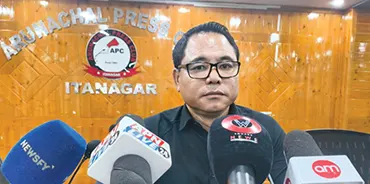Staff Reporter
ITANAGAR, 30 Jul: The Adi Baane Kebang (ABK) has reiterated its demand that the Common University Entrance Test (CUET) be conducted in other districts of the state, as there are at present only two CUET centres in the state – one in the capital, and the other in Namsai district.
Addressing mediapersons at the press club here on Tuesday, ABK general secretary Vijay Taram said that “on 11 January this year, a notification was issued by RGU, stating that 80 per cent of the examination would be under the RGUET and 20 per cent under the CUET.”
“Another notification was issued on 27 April, stating that 100 per cent will be CUET,” Taram said, adding that, “after the demand placed by the ABK, the RGU has rolled back.”
The ABK has demanded that, in the next session, “CUET should be held in other parts of the districts, so that students from all corners may not miss the entrance exam.”
Taram meanwhile responded to the statement of Siang Indigenous Farmers’ Forum legal adviser Bhanu Tatak, who had last Saturday during a press conference said that the government should listen to both the parties before giving the nod to construction of a dam over the Siang River.
The ABK GS said that “the ABK – the apex body of the Adi community – stands with the proposal that a pre-feasibility report be submitted, which has been sought by the state government and has not yet taken place.”
He, however, clarified that the ABK “has not given the nod for the construction of the Siang multipurpose dam.”
“We have only suggested that the pre-feasibility report be submitted, and that the decision as to whether dams should be constructed will be taken only after a proper sitting will all the stakeholders.”
He brought up the existence of the Bogum Bokang Kebang (BBK), which was founded in 1947, and said that it works as a judicial wing of the the ABK.
“The BBK resolves any dispute that takes place under the ABK, and the final affiliate authority is the ABK,” he said, adding that “as an Adi, one should not misinterpret. We believe in the kebang system,rather than the judiciary system.”




